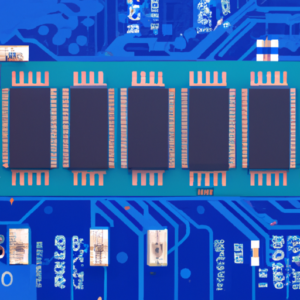Well Howdy There, Let’s Talk RAM!
Ladies and gentlemen, let me introduce you to the wonderful world of Random Access Memory, commonly known as RAM. Now, we all know that computers have a certain storage capacity, but did you know that having more RAM can impact your computer’s speed and overall storage capacity?
So, what is RAM exactly? RAM is a type of computer memory that temporarily stores data for your computer to access quickly. Think of it like a workspace for your computer, where it can easily access frequently-used programs and files without having to repeatedly search for them in the hard drive.
There are several types of RAM available, including Dynamic RAM (DRAM), Synchronous Dynamic RAM (SDRAM), and Double Data Rate Synchronous Dynamic RAM (DDR SDRAM). Each type offers different levels of speed and efficiency.
Now, how does RAM impact your computer’s storage capacity? RAM plays a crucial role in how much data your computer can store and access quickly. By increasing your RAM, you can free up space in your hard drive and improve your computer’s performance. Plus, with more RAM, you can easily switch between multiple programs and run larger applications without experiencing lag.

All in all, RAM is a valuable asset to any computer setup, and increasing your RAM can lead to improved performance and overall storage capacity. So, next time you think about upgrading your computer, consider adding some more RAM for an even smoother experience!
What is RAM?
Well, let me tell you, RAM stands for Random Access Memory. It’s essentially the short-term memory of your computer. When your computer runs a program, it pulls the necessary data from your hard drive and stores it in the RAM for quicker access. There are two types of RAM: DDR and SDRAM. DDR stands for Double Data Rate, and it’s faster than SDRAM. SDRAM stands for Synchronous Dynamic RAM, which is still used in older computers. In simpler terms, RAM affects your computer’s multitasking abilities and speed. The more RAM you have, the more programs you can run at once without slowing down your computer. It’s important to note that RAM does not directly affect your computer’s storage capacity. Storage capacity is determined by your hard drive or SSD. However, increasing your RAM can indirectly improve storage capacity by allowing your computer to run efficiently and handle larger tasks with ease.
Exploring the Impact of RAM on PC Storage Capacity
Now that we have a basic idea of what RAM is and its types, let’s dive into the importance of RAM in PC storage capacity. RAM plays a crucial role in ensuring that your computer can perform multiple tasks simultaneously without lagging or crashing. Essentially, RAM acts as a temporary storage for your computer’s active programs and data that require frequent access. As you add more RAM to your computer, you increase your PC’s storage capacity, which means that it can handle more processes and programs while minimizing the risk of slowdowns or crashes.
Increasing your RAM can benefit you in several ways. Firstly, it allows you to run more demanding programs and apps that require higher memory allocation without causing significant slowdowns. Secondly, it enables faster data transfer between your computer’s memory and processor, resulting in rapid processing of data. Thirdly, it reduces the time taken to switch between different programs, making multitasking smoother and more efficient.
However, it’s important to note that maximizing your RAM isn’t a solution to all storage-related issues. Especially if your computer’s storage hard drive is nearly full or runs on slower storage technology, simply adding more RAM won’t improve its performance. Therefore, it’s crucial to assess the entire system configuration and upgrade other components if required to ensure optimal performance.
The ideal strategy for optimizing your PC’s performance is to find the right balance between RAM, storage capacity, and other system components such as the CPU, motherboard, and graphics card. While expanding RAM size to incorporate new software or to cope with heavy usage is good, you must ensure that your hardware is compatible with the RAM you choose and consider future additions. Expert advice translates into buying high-performance RAM that works with your motherboard and choosing a storage system that caters to your work requirements, minimizing unnecessary adds-ons.
Wrapping it up: My Takeaways on RAM and PC Storage Capacity
Well, that’s a lot of information about RAM and PC storage capacity! To sum it up, RAM is the crucial memory component that gives your computer the power to perform multiple tasks at once. It’s easy to picture RAM as your desktop’s short-term memory.
If you’re looking to boost your PC’s storage capacity, increasing RAM is a great place to start. Not only does it help your computer run more smoothly, but it also enhances its performance when running bigger, more memory-intensive apps.
There’s really no substitute for RAM when it comes to optimizing your PC’s performance. It’s an essential upgrade that can make all the difference in how fast your computer runs.
So, if you’re experiencing slow load times or laggy app performance, don’t hesitate to upgrade your RAM. It’s a simple solution that can save you time and headaches in the long run.